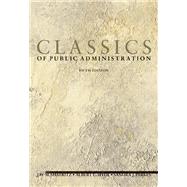
Note: Supplemental materials are not guaranteed with Rental or Used book purchases.
Purchase Benefits
What is included with this book?
| Part One Early Voices and the First Quarter Century (1880's to 1920's) | 1 | (71) | |||
|
|||||
|
16 | (6) | |||
|
|||||
|
22 | (13) | |||
|
|||||
|
35 | (3) | |||
|
|||||
|
38 | (5) | |||
|
|||||
|
43 | (3) | |||
|
|||||
|
46 | (4) | |||
|
|||||
|
50 | (6) | |||
|
|||||
|
56 | (8) | |||
|
|||||
|
64 | (8) | |||
| Part Two The New Deal to Mid-Century (1930's to 1950's) | 72 | (116) | |||
|
|||||
|
90 | (9) | |||
|
|||||
|
99 | (5) | |||
|
|||||
|
104 | (5) | |||
|
|||||
|
109 | (9) | |||
|
|||||
|
118 | (5) | |||
|
|||||
|
123 | (8) | |||
|
|||||
|
131 | (5) | |||
|
|||||
|
136 | (14) | |||
|
|||||
|
150 | (5) | |||
|
|||||
|
155 | (7) | |||
|
|||||
|
162 | (9) | |||
|
|||||
|
171 | (6) | |||
|
|||||
|
177 | (11) | |||
| Part Three From JFK to Civil Service Reform (1960's and 1970's) | 188 | (182) | |||
|
|||||
|
206 | (11) | |||
|
|||||
|
217 | (16) | |||
|
|||||
|
233 | (5) | |||
|
|||||
|
238 | (12) | |||
|
|||||
|
250 | (8) | |||
|
|||||
|
258 | (13) | |||
|
|||||
|
271 | (14) | |||
|
|||||
|
285 | (13) | |||
|
|||||
|
298 | (4) | |||
|
|||||
|
302 | (13) | |||
|
|||||
|
315 | (13) | |||
|
|||||
|
328 | (11) | |||
|
|||||
|
339 | (4) | |||
|
|||||
|
343 | (7) | |||
|
|||||
|
350 | (5) | |||
|
|||||
|
355 | (15) | |||
| Part Four From Reagan to Reinvention (1980's and 1990's) | 370 | ||||
|
|||||
|
396 | (18) | |||
|
|||||
|
414 | (9) | |||
|
|||||
|
423 | (11) | |||
|
|||||
|
434 | (12) | |||
|
|||||
|
446 | (12) | |||
|
|||||
|
458 | (9) | |||
|
|||||
|
467 | (10) | |||
|
|||||
|
477 | (10) | |||
|
|||||
|
487 | (7) | |||
|
|||||
|
494 | (9) | |||
|
|||||
|
503 | (14) | |||
|
|||||
|
517 | (16) | |||
|
|||||
|
533 | (23) | |||
|
|||||
|
556 | (8) | |||
|
|||||
|
564 | (7) | |||
|
|||||
|
571 |
The New copy of this book will include any supplemental materials advertised. Please check the title of the book to determine if it should include any access cards, study guides, lab manuals, CDs, etc.
The Used, Rental and eBook copies of this book are not guaranteed to include any supplemental materials. Typically, only the book itself is included. This is true even if the title states it includes any access cards, study guides, lab manuals, CDs, etc.